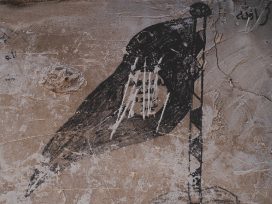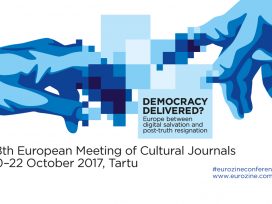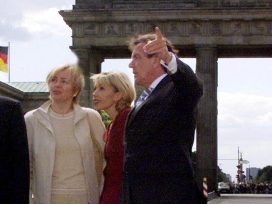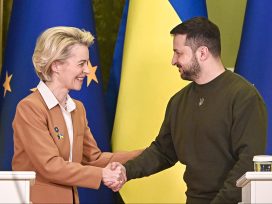It is no secret that Russia is once again assuming the features of a totalitarian state, and that it uses systematic propaganda to achieve its goals in its former colonies, which include, of course, Lithuania. The fact that our large neighbour distorts the history, politics and everyday life of the Baltic countries, introducing ideologically mythologized images and spreading disinformation, whether blatant or concealed, is nothing new. For a long time, however, people took no notice, the explanation being that Russian propaganda, though unpleasant, was unimportant. And even if it was important, then arguing with it only gave it more weight. However, I tend to agree with Edward Lucas that we cannot and must not try to stop people reading fake news, but that we can and must warn them about the rubbish they are consuming.
People generally evaluate news and information purely emotionally, ignoring the facts. This causes mental coercion to remain hidden. Everyday attacks on the mind now take on chameleon, hybrid forms, making it increasingly easy for political technologists to spread fake news. On the frontlines of the information war, culture is turned into a powerful weapon. Unfortunately, Lithuania’s defences are weak. There are two possible reasons for this. Either, Lithuanian culture is simply not strong enough to fend off the propaganda attacks, or it refuses to do so. Whether it will be possible to increase society’s resistance to the stream of lies and slander – that, I would say, is a Hamlet-like question.
Cultural information war
Information wars are not new to Lithuania. In the interwar years, the flow of propaganda and agitation from the USSR spread to Lithuania, and many prominent persons from the intelligentsia succumbed uncritically to its influence, with tragic consequences. For example, historical research shows that, before WWII, leading Lithuanian intellectuals, including a number of writers, were regularly entertained by the Soviet embassy in Kaunas. As result, many developed a positive view of Stalinist Russia. Historians have also shown that publications of the pre-war Lithuanian Nationalist Union (Tautininkai) were funded by the Soviet sources.
We cannot correct the past, but it is essential to learn from one’s mistakes. If society is able to think critically, then it will be able to distinguish between manipulation and information. But how can this be achieved when the main source of critical thinking – the media – is sinking ever deeper in the quagmire of vapid entertainment? Only ‘the client’, i.e. society, can demand that the media take on their social responsibility to strength informational literacy. It would seem that a vicious cycle is out at work.
Lithuania, a border state with Russia, is under increasing geopolitical pressure at a time when, across the EU, popular discontent and frustration are growing rapidly, and when Euroscepticism and anti-liberalism are on the rise. The manipulation of the public fear of ‘foreigners’ is deepening the conflict in values and culture. Culture is especially important in helping to dispel myths, false images and stereotypes. However, is a common European culture powerful enough to strengthen the unity of Europe – a unity without which it will be impossible to resist new attempts to enslave the mind? Or is culture itself being transformed into a propaganda tool?
Ten years ago, many people in Lithuania looked indulgently at the Russian tendency to turn certain artistic genres, in particular film, into propaganda (it is no coincidence that Lenin called cinema, ‘of all the arts the most important’). The new Russian cinema seemed intriguing and even somewhat exotic. Critical evaluations were avoided and a blind eye was turned. Take, for example, an article banally entitled ‘Historical Films and History’, discussing the Russian historical drama 1612 (2007).The film, which was produced by the veteran Russian producer Nikita Mikhalkov, is set during the Muscovite war with the Polish-Lithuanian Commonwealth during the seventeen century. History is turned upside down: the Polish Kingdom and Grand Duchy of Lithuania are portrayed as eternal enemies of Russia whose defeat is a turning point in Russian history and represents a victory for Orthodoxy over Catholicism. In other words, history becomes a servant of the present (the director of the film, Vladimir Khotinenko, remarked that Russians ‘are nostalgic for a Tsar’). The author of the article, however, seemed untroubled by the fact that a blatant attempt was being made to rewrite Russian history, not to mention the history of several of Russia’s neighbouring countries, using popular forms of aesthetic expression.
An expert interviewed for the article, this time a historian, explained the film as if it had nothing to do with the history of the Grand Duchy of Lithuania, nor with current relations between Russia and Lithuania: ‘It is not worth worrying that films which, in the opinion of historians, distort the truth (and that is how 1612 is being evaluated) will be taken at face value by viewers’. Communication studies, the author continued, have shown that recipients of information are not passive: ‘on the contrary, they are subjects creating individual meanings on the basis of the received information […]. The question is not how much “truthful” history viewers find in a film but whether, generally speaking, they expect it to contain truth.’
Reading this, one might conclude that the author had never heard of the Toronto school of communication of the 1930s, which unequivocally stated that media technologies are not neutral. Today it is commonly accepted that our understanding of reality is dependent on the structure of that information and the form it is presented in. So, what should we be saying about the power of persuasion of today’s popular culture, its impact on consciousness, ways of thinking and behaviour? The titles of two of Marshall McLuhan’s books say it all: The Violence of the Media and Culture is Our Business. Or has nowadays everything been turned upside down? Is the media no longer violent and culture no longer our business?
Looking behind lies
The post-modern, relativistic attitude that defends that the right of all and sundry to wallow in a sea of lies is characteristic of many intellectuals. They hope, whether sincerely or not, that people will be able to separate the wheat from the chaff. And if they can’t, not to worry: people go to see popular films for enjoyment, not because they have any connection to actual historical events. So, let’s calm down – each of us is personally responsible for the information swilling around in our heads, as Mao used to teach. However, was it not experts like this that Lenin had in mind when he rejoiced that the world was full of ‘useful idiots’?
The journalist Artūras Pučėta, in his article ‘Russian Chauvinism in the film 1612 and its links with the Lithuanian film industry’, unravelled the film’s subtexts. Discussing the reviews of the film in international publications, he highlighted its hidden propaganda and linked it to the December 2007 elections in Russia. After that, as we know, Vladimir Putin temporarily became prime minister, but in possession of all the powers of a president. Of course, that was not the result of the film. But, as the saying goes, constant dripping wears away a stone. In Russia, drips form a flood. The people want a Tsar? The people will get a Tsar…
Pučėta also made some interesting points about the interests of the Lithuanian film industry. A representative of the agency distributing the film rejoiced at the triumphant march of 1612 through Lithuania’s cinemas: ‘If people remember history and begin to discuss it, that will only make things better. In my opinion, everyone has the right to interpret the past in their way.’ Without refuting the right of anyone to interpret historical events how they want, it still seems necessary to point out that there exist films, books, and other works of art that deliberately seek to influence public consciousness.
Moreover, as well as people’s right to free interpretation, shouldn’t we also be talking about transactions involving business, politics and ideologized culture? Particularly when an aggressive foreign state uses cultural policy to trample on historical truth, inflicting damage on the interests of another? I am not arguing that this or other films should be censored. However, an anecdote comes to mind: a person is watching a Russian TV channel and suddenly starts screaming, ‘Look, they’ve occupied us again!’
Bluff, otherwise known as culture
Here is another example of bluff, otherwise known as culture. The largest news website in Lithuania, delfi.lt, recently published an article with the unambiguous title: ‘Amazement abut a film being shown in Lithuania: Russians are creating propaganda about our occupation and we are silent’. The article received a flood of anonymous comments, revealing that readers find this subject of considerable interest. Of course, opinions differed. The article discusses the reactions of viewers to the film Cold Tango (Pavel Chukhray, 2017). Advertised as a ‘romance’, it contains a host of propaganda clichés about the interwar and post-war periods in Lithuania. The film’s distributors, like their colleagues a decade earlier, had no scruples about handling a film rubbishing Lithuania’s history. Both the marketing representative for Forum Cinemas, the largest cinema network in Lithuania, and the representative of the film’s distributor in Lithuania, denied that there was even a hint of propaganda or historical distortion in the film. Guaranteeing this was the fact that Cold Tango ‘was shot in Lithuania with our actors, who, we would hope, are patriots’. What a weighty argument!
The distributor’s claim that Cold Tango had been approved for screening by the Film Council of the Republic of Lithuania was also untrue. Instead, this was done by Lithuania’s Film Indexing Commission, which merely assigns age ratings and censors pornography. Even more interesting was the distributor’s claim that ‘We think that this film is realistic. We looked and really did not find any propaganda in it.’ The pronoun ‘we’ is used rhetorically – the aim being to remove any shadow of suspicion from the film so that nothing stands in the way of the distributors making money. For when profits are involved, even the most blatant of lies and ideological and political falsifications cease to be a problem.
Fake news and geopolitics
When speaking about individual cultural products and their interpretation, one ought not to lose sight of the wider political context. Lately, Russia has started waging an intensive and aggressive propaganda campaign against the West, in particular against the countries of the ‘near abroad’ which it occupied more than half a century ago.
In 2017, one piece of fake news in Lithuania echoed throughout the world. On the eve of Lithuanian Independence Day, the police and the Speaker of the Seimas (parliament) received a mail about German Nato soldiers raping a girl from a care home. The ‘news’ was circulated however quickly refuted, after the police ascertained that the information was false. They also quickly found out that the tip off had been sent from a server in Russia, although it was possible the sender could be a Lithuanian. Shortly after the mail was sent, the mailbox was deleted.
The information was disproved but the disinformation spread widely. Even now, some Vilnius taxi driver with his radio tuned to Russian Radio will, in conspiratorial tones, be horrifying his passenger with newly discovered details about ‘that rape’. Whatever falls into everyday consciousness stays there. This piece of fiction was neither unintentional nor uncommon. A dense web of disinformation and lies has been woven around Lithuania and the other Baltic countries, in which the region’s inhabitants frequently get entangled – particularly the Russian speakers, who regularly consume Russian mass media. Television, radio, social networks, eternal allegiance to the new ‘little father’, as the Tsar as head of the Orthodox Church was colloquially known.
Of course, the target is not only Lithuania: in 2016, Russian TV carried a number of programmes about Estonia, including an interview with Dmitry Linter and Yana Toom. Linter was a leader of the Estonian-Russian opposition to the notorious re-location of the bronze soldier in Tallinn in 2007 and was deported from Estonia after the rioting, while Toom is an Estonian MEP well-known for her pro-Russian views, who actively participated in organising a joint petition about the supposed violation of the rights of Russian speakers in the Baltic countries and whom the Estonian security services have referred to as ‘an agent of Russian influence’.
Similarly, the European United Left–Nordic Green Left (GUE–NGL) group in the European Parliament recently announced that it would be preparing a resolution aimed at condemning the Baltic states, allegedly for being unable to control ‘extreme rightwing and fascist sentiments’. As Lithuanian MEP Valentinas Mazuronis pointed out, the very fact that the announcement ‘was distributed exclusively on Russian-supported media outlets shows that there is active cooperation between some MEPs and Russian diplomats.’
Clearly, there are more and more people unable to distinguish between freedom of expression and deliberate, professionally manufactured propaganda used to brainwash not only Russia’s own inhabitants, and not only countries that have comparatively recently thrown off Soviet rule, but also parts of the West that never experienced totalitarian dictatorship.
Targeting the history of the Lithuanian resistance
Attempts to introduce interpretations of history favourable to the Kremlin are also becoming increasing apparent. Ever since 1991 and the bloody events of 13 January, the mantra has been repeated that it was not Soviet tanks that crushed people at the Vilnius TV tower and that Lithuanians were shooting at their own people. Algirdas Paleckis, a Lithuanian MP from 2004–2007, was prosecuted in 2012 for claiming this. Nevertheless, this version of events continues to be disseminated by a number of far-left political figures and groups of people with pro-Russian views.
Although open statements are usually avoided, sometimes even old hands lose their self-control. This is what happened to Maria Zakharova, the official spokesperson of the Russian Ministry of Foreign Affairs, in Summer 2017. Reacting to a Nato documentary commemorating the post-war resistance in the Baltic countries shown on social networks, she referred to the resistance as a gang of criminals and residual fascists responsible for ‘more than 3000 acts of sabotage, the victims of which were thousands of peaceful citizens’.
Once the veil of romantic stories and fanciful ‘historical’ subjects has been thrown off, we return to the same old, obdurate lies propagated over decades in various forms and on various occasions about ‘Baltic Fascists’ fighting against the ‘legitimate’ government, ‘elected by the people’. To talk about ‘everyone’s right to interpret the past in their own way’ in this case is hardly appropriate. An occupied country resisted its occupiers. Was this not its existential right?
It is no surprise to hear such accusations from an official of the Russian Foreign Ministry – she is working to her brief. But such views are not restricted to Russia. Recently, a prominent figure in Lithuanian cultural life stated that fighting against civilian collaborators in the post-war years was criminal. He was reacting to the re-publication on Facebook of a historical proclamation issued by Lithuanian partisans after WWII. In it, the partisans threatened to kill Soviet collaborators and people taking part in the organization of collective farms. ‘By what definition, he asked, ‘can organizing collective farms be equated to crimes against humanity and what ethical norm allows people to be threatened with being killed?’.
This moralizing statement fails to take into account number of facts proven by published research. Among them, that a large number of ‘civilian’ collaborators were armed by the Soviets and that they were aided by paramilitary groups known in Russian as istrebiteli (destroyers). These heavily armed paramilitary squads organized by the Soviet regime operated in all rural areas and protected the organizers of collective farms. Moreover, historians have proved on the basis of archival evidence that killings allegedly carried out by anti-Soviet resistance fighters were in a number of cases planned and carried out by the Soviet NKVD (predecessor of KGB), employing former partisans arrested by the Soviets and recruited as agents after heavy torture. The partisan resistance was largely destroyed by these perpetrators. This said, there were civilian casualties for numerous reasons, including false denunciations.
It is, then, worth remembering the words of the Lithuanian president Valdas Adamkus: ‘For Lithuania, like many other eastern European nations, May 8 of 1945 did not bring victory over violence, but simply a change of oppressor. Once again, history was turned into the handmaiden of politics and ideology and thrust upon Lithuania and its people to cover up injustice and crime, distort facts, slander independence and freedom-fighters. Today, after more than six decades, it is evident that victory without the foundations of trust and morality is no victory, while history based on falsification is no history.’
Historical falsifications have never been as plentiful as they are now. Sometimes, there are even comical confessions of love for the Soviet period. Not that long ago, on the occasion of Victory Day on 9 May, a prominent member of the Lithuanian Social Democratic Party congratulated those who had served as Soviet soldiers. She was nostalgic for Russia, she wrote. Defending her comment, the young Social Democrat explained that she was referring personally to her husband, who had served in the Soviet army in the last years of ‘dependence’ (a euphemism for occupation). The chairman of her party did not consider this ‘nostalgia’ to be a stain on the reputation of his party – it only showed the ‘lack of experience’ of a young (though influential) party member. With more experience, will she know how to hide her political nostalgia?
Time to take propaganda seriously
According to Andrius Vaišnys of the Vilnius University Faculty of Communication, ‘Since Putin came to power, the Russian media has been instructed to form pro-government opinion. With the media business having become, with the help of censorship, a mouthpiece for the authorities, the reliability of Russian sources of information has declined. Western media should be especially critical of those sources […] Russia is waging a political battle and its information war arsenal is a good deal bigger that Kiselyov’s programme on the Russia-1 television channel or all of Russia Today. Russia has simply institutionalized propaganda, … which embraces culture, the military complex, sport, economics, diplomacy…’
Those are the most obvious areas but there are many more that are hidden. Would it have been possible to imagine some five years ago that Moscow could influence even the US presidential elections? A host of things from ‘the realm of fantasy’ are now becoming an everyday reality of the dark arts. The Russian the propaganda industry is spreading its ‘products’ throughout the world – indeed, it is already becoming the main export of that country.
Lithuania, which is on the front lines of the information war, is beginning to wake up to the danger. There are now more and more focused journalistic studies, for example, on the origin of the concept of ‘the Russian world’ and what it means for Lithuania, or why Russia provides financial support to Lithuanian social organisations. Research on the subject of hostile propaganda is also being undertaken. Nevertheless, society is still in a somnolent state and, as Francisco de Goya demonstrated, the sleep of reason gives birth to monsters.
We have neither fully grasped the goals of the information war and the diversity of the weapons used, nor are we aware of the enormous risk political propaganda poses. Instead of looking for effective forms of informing and educating society, we hurry to introduce prohibitions, even though we know that forbidden fruit is always the sweetest. Post-Soviet Lithuania has been slow to understand that inner freedom is existentially important. This lethargy will surely exact a price, and not an insignificant one.










